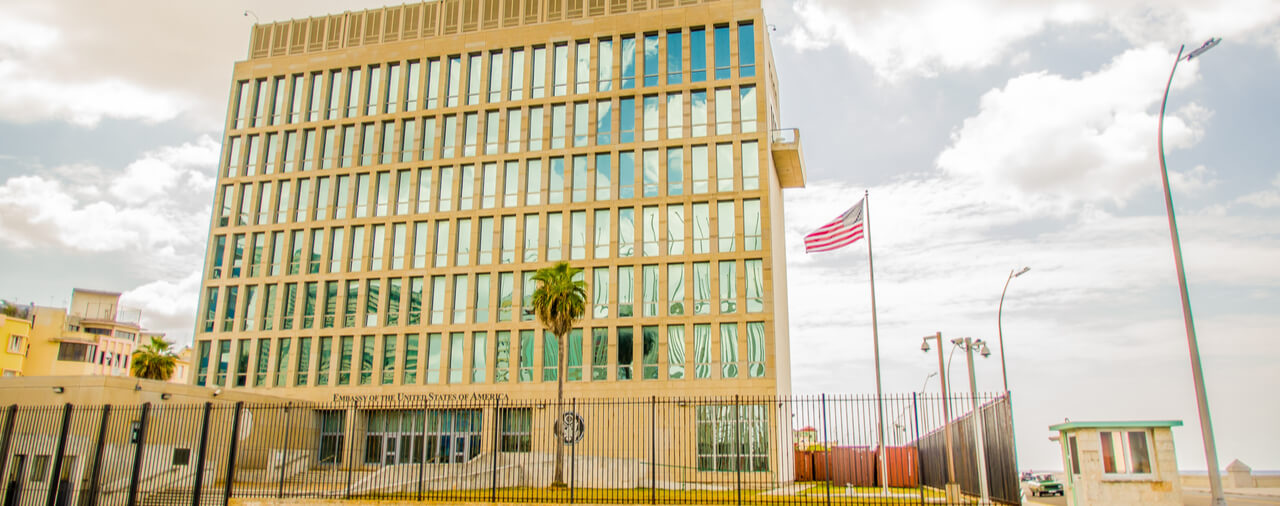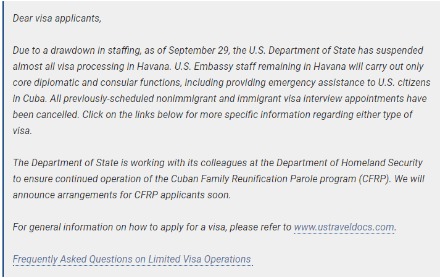- Update
- Introduction
- DOS Suspends Almost All Visa Processing in Havana
- USCIS Temporarily Suspends Operations at Field Office in Havana
- Conclusion
Update
The USCIS permanently closed the Havana Field Office on December 10, 2018. Most of its operations will be taken over by the USCIS’s Mexico City Field Office. Please see our blog for more details [see blog].
(Mar. 6, 2018 Update): On March 2, 2018, the DOS announced that the U.S. Embassy in Havana will “continue to operate with the minimum personnel necessary to perform core diplomatic and consular functions, similar to the level of emergency staffing maintained during ordered departure” [see blog]. Although the DOS did not publish a new immigration update, the visa processing services and USCIS services in Cuba will presumably continue to be limited. We will post further updates as more information becomes available.
Introduction
On September 29, 2017, the DOS withdrew all non-essential staff from the U.S. Embassy in Havana. As a result, the U.S. Department of State (DOS) suspended almost all visa processing at U.S. Embassy Havana. On December 22, 2017, the United States Citizenship and Immigration Services (USCIS) suspended operations at its field office in Havana, also as a result of the DOS draw-down. In this article, we will examine what this means for Cubans seeking visas through consular processing or filing forms with the USCIS.
To learn more about recent developments on U.S. immigration and Cuba, please see our blog post on an memorandum issued by President Donald Trump that touched on the subject [see blog].
DOS Suspends Almost All Visa Processing in Havana
Beginning on September 29, 2017, the DOS drastically reduced its staff at U.S. Embassy Havana, leaving only critical personnel. Accordingly, as we previously noted [see blog], the DOS suspended almost all visa processing at U.S. Embassy Havana:
[Click image to view full size]
The DOS has posted its answers to frequently asked questions about what this means for Cubans seeking visas [PDF version]. We will examine some of the key points of the FAQ below.
While U.S. Embassy Havana is not conducting further visa interviews and has cancelled previously scheduled interviews, Cubans are not precluded from applying for a visa at another U.S. embassy or consulate. A Cuban visa applicant may apply for a visa at a different U.S. embassy or consulate online.
DOS noted that those whose visa appointments were cancelled at U.S. Embassy Havana are not eligible for refunds. Furthermore, the payments are not transferrable to another embassy or consulate. However, any fees paid for interviews at U.S. Embassy Havana remain valid for one year, and may be used for another visa application in Havana within one year of payment if the United States resumes visa processing.
U.S. Embassy Havana clarified that it has also cancelled previously-scheduled immigrant visa and Cuban Family Reunification Program applications. It stated that it would reschedule Cuban Family Reunification Program applications to the U.S. Embassy in Bogotá, Colombia. It stated that it would be contacting applicants with interviews scheduled between September 12 and December 31 to reschedule their appointments. Pending immigrant visa applications for Cubans will also be processed at the U.S. Embassy in Bogotá. According to the FAQ, most applicants who had interviews scheduled at U.S. Embassy Havana should have already been contacted by the DOS. The DOS advised applicants to not seek visas to enter Colombia for interviews until they receive an appointment notice from DOS. Medical exams that were already completed in Cuba are acceptable for processing provided that they remain valid. Notably, this also applies to Cuban winners of the diversity lottery.
The U.S. Embassy Havana will still process visa applications in very limited cases. These cases are for diplomatic or emergency travel (A or G visas) or in “extremely rare emergency cases … when the applicant has a life-threatening illness requiring treatment in the United States.” In the latter case, the applicant must present a letter from a physician or medical facility in the United States stating that the physician or medical facility is (1) willing to treat the applicant for his or her specific ailment, and (2) detailing the projected length and cost of treatment. An applicant may contact the U.S. Embassy Havana to make an appointment if he or she is seeking a visa based on this limited medical exception.
USCIS Temporarily Suspends Operations at Field Office in Havana
On December 22, 2017, the United States Citizenship and Immigration Services (USCIS) announced that it is temporarily suspending operations at its field office in Havana [PDF version]. This decision, which was prompted by staff reductions at the U.S. Embassy Havana, is effective immediately.
The suspension of operations at the USCIS’s field office in Havana and staff reductions at U.S. Embassy Havana do not mean that Cubans are precluded from seeking visas or other immigration documents. The USCIS explained that its field office in Mexico City will assume the jurisdiction of the USCIS field office in Havana while the suspension is in effect. The USCIS field office in Havana only has jurisdiction over Cuba.
In light of the USCIS field office in Mexico City assuming jurisdiction over Cuba, the USCIS provided the following filing instructions for Cubans filing petitions or applications with the USCIS:
| Service/Form | Filing Instructions |
| Form I-130, Petition for Alien Relative | File your petition by mail with the lockbox facility in Chicago. You can find additional filing information on the Form I-130 webpage. |
| Form I-131A, Application for Travel Document (Carrier Documentation) | If you are a lawful permanent resident (LPR) who has lost your LPR card and/or re-entry permit and you need travel documentation to return to the United States, you can file your Form I-131A with any U.S. Embassy Consular Section or USCIS international field office outside of Cuba. If you have a pending Form I-131A application, USCIS will be contacting you to provide further instructions on the processing of your case. |
| Form I-407, Record of Abandonment of Lawful Permanent Resident Status | Submit your Form I-407 by mail to the Mexico City Field Office or present it in person to any U.S. Embassy or Consulate or USCIS international field office outside of Cuba. |
| Form I-730, Refugee/Asylee Relative Petition | You must file your petition with the Nebraska or Texas Service Center, depending on where you live in the United States. We are working with the U.S. Department of State to reschedule any Form I-730 cases that were in-process at the U.S. Embassy in Havana and will be contacting affected petitioners and beneficiaries in the near future. For Form I-730 cases not yet scheduled for interview, the U.S. Department of State’s National Visa Center will notify concerned parties when an interview is scheduled at a designated post. |
| Form N-400, Application for Naturalization | If you are a member of the U.S. military and are stationed overseas, please see the Form N-400 form page or call 800-375-5283 for the most current form filing instructions. We will forward the application to the appropriate international field office. For qualified children of active-duty service members stationed abroad, the proper form to file is the N-600K, Application for Citizenship and Issuance of Certificate Under Section 322. |
| Cuban Family Reunification Parole (CFRP) Program | We are working with the U.S. Department of State to ensure that the CFRP Program continues to operate and will announce arrangements for interview/travel document processing for CFRP beneficiaries soon. |
| Cuban Medical Professional Parole (CMPP) Following-to-Join Spouse or Child | We are working with the U.S. Department of State to ensure that CMPP following-to-join cases continue for spouses and children to be processed and will announce arrangements for interview/travel document processing soon. |
We have included contact information for the USCIS field office in Mexico City [PDF version].
Conclusion
The suspension of visa processing in Cuba and the closure of the USCIS field office creates an inconvenient situation for Cubans seeking immigration benefits in the United States. Those who have pending applications or who intend to apply for a visa or other benefits should consult with an experienced immigration attorney for case-specific guidance.






